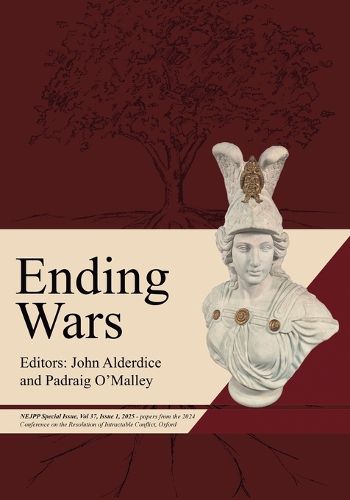Readings Newsletter
Become a Readings Member to make your shopping experience even easier.
Sign in or sign up for free!
You’re not far away from qualifying for FREE standard shipping within Australia
You’ve qualified for FREE standard shipping within Australia
The cart is loading…






This title is printed to order. This book may have been self-published. If so, we cannot guarantee the quality of the content. In the main most books will have gone through the editing process however some may not. We therefore suggest that you be aware of this before ordering this book. If in doubt check either the author or publisher’s details as we are unable to accept any returns unless they are faulty. Please contact us if you have any questions.
These are frightening times. How can we understand what is happening and can we do anything about it?Wars arise because human beings have differing desires and conflicting interests. When one group decides to impose their will on others and the victims resist, there is a conflict. If the aggressors use physical violence and the victims resist with force, the fight may escalate and last long enough to qualify as a 'war'. For much of our history, and pre-history, this is how most groups conducted their relationships with each other. Until 1945 the limits of our capacity to destroy our enemies and wreak havoc on our environment, ensured that after a violent conflict, while damage was done and many people perished, the world and humanity could repair themselves. Since the development of the nuclear bomb there can be no such reassurance. After the two World Wars it was hoped that the end of empires, the spread of liberal democracy, and the development of international law could contain the risks. For a time, the limited number of nuclear states and the recognition of the existential consequences of a nuclear war ensured a degree of restraint mediated through the development of global political institutions and international law. Today we watch with mounting fear as we see those restraints dissolving. As the months pass, ever fewer states can be regarded as liberal democracies that respect human rights and the rule of law, and at the same time human activity has increasingly impacted the adaptive systems of the natural world and damaged their capacity for repair. So, while we are faced with the prospect of both nuclear holocaust and environmental catastrophe, and only modest evidence of humanity taking either threat sufficiently seriously, the guard-rails of liberal democracy are dissolving. We are living though the most dangerous time in the history of homo sapiens. What is to be done? This multi-author volume addresses the challenge of 'Ending Wars' and is the companion volume to the recently published book on 'The Changing Character of War and Peacemaking'. Together they make a significant contribution to our understanding of the challenges of war and peace, but they also identify possible ways of understanding and addressing them.
$9.00 standard shipping within Australia
FREE standard shipping within Australia for orders over $100.00
Express & International shipping calculated at checkout
Stock availability can be subject to change without notice. We recommend calling the shop or contacting our online team to check availability of low stock items. Please see our Shopping Online page for more details.
This title is printed to order. This book may have been self-published. If so, we cannot guarantee the quality of the content. In the main most books will have gone through the editing process however some may not. We therefore suggest that you be aware of this before ordering this book. If in doubt check either the author or publisher’s details as we are unable to accept any returns unless they are faulty. Please contact us if you have any questions.
These are frightening times. How can we understand what is happening and can we do anything about it?Wars arise because human beings have differing desires and conflicting interests. When one group decides to impose their will on others and the victims resist, there is a conflict. If the aggressors use physical violence and the victims resist with force, the fight may escalate and last long enough to qualify as a 'war'. For much of our history, and pre-history, this is how most groups conducted their relationships with each other. Until 1945 the limits of our capacity to destroy our enemies and wreak havoc on our environment, ensured that after a violent conflict, while damage was done and many people perished, the world and humanity could repair themselves. Since the development of the nuclear bomb there can be no such reassurance. After the two World Wars it was hoped that the end of empires, the spread of liberal democracy, and the development of international law could contain the risks. For a time, the limited number of nuclear states and the recognition of the existential consequences of a nuclear war ensured a degree of restraint mediated through the development of global political institutions and international law. Today we watch with mounting fear as we see those restraints dissolving. As the months pass, ever fewer states can be regarded as liberal democracies that respect human rights and the rule of law, and at the same time human activity has increasingly impacted the adaptive systems of the natural world and damaged their capacity for repair. So, while we are faced with the prospect of both nuclear holocaust and environmental catastrophe, and only modest evidence of humanity taking either threat sufficiently seriously, the guard-rails of liberal democracy are dissolving. We are living though the most dangerous time in the history of homo sapiens. What is to be done? This multi-author volume addresses the challenge of 'Ending Wars' and is the companion volume to the recently published book on 'The Changing Character of War and Peacemaking'. Together they make a significant contribution to our understanding of the challenges of war and peace, but they also identify possible ways of understanding and addressing them.